*/
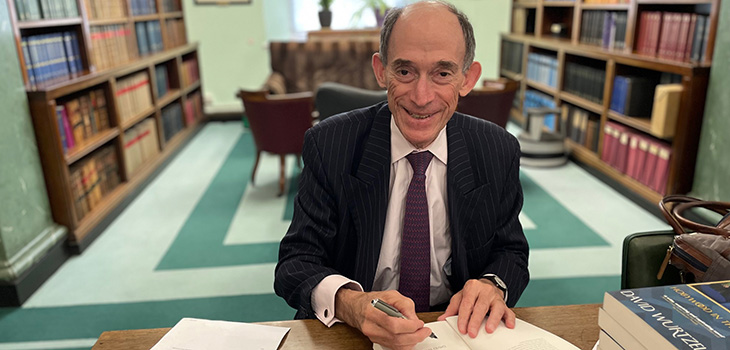
I was born in Hollywood. Jewish children in Los Angeles in those days were born in Cedars of Lebanon Hospital which was located in the part of town that was unquestionably Hollywood. As it happens, since 1917 my father’s family had worked in the movies, at what became 20th Century Studios. Until the age of 13, when I needed a haircut my mother would drive me to the barber’s shop on the Fox lot. We also used the dentist who practised out of Shirley Temple’s former bungalow.
My first cultural experiences were thus film and being taken to the movies. In due course my preferences shifted from the 1950s to the golden age of the 1930s-40s including any movie which co-stars Cary Grant and Katharine Hepburn. I remain devoted to the great American musicals in which pantheon I also place Sondheim. He has been produced brilliantly on the English stage, attracting actors who can do anything (I have seen Judi Dench in A Little Night Music and as Cleopatra; Adrian Lester in Company and as Othello). I also enjoyed Sondheim’s shows at RADA, whose students (among the most diverse I have witnessed) have a knack for it.
I had an inspiring American literature teacher in high school who introduced me to Faulkner, Hawthorne, Dickinson and Eugene O’Neill. Fitzgerald, Hemingway and Anne Tyler would come later. And in due course, Waugh, Trollope, Jane Austen and Zola.
When I arrived in England for my junior year abroad I discovered an unsatisfied – soon to be insatiable – love of theatre and something called opera. The latter started well with The Magic Flute. I will see anything by Mozart, Richard Strauss and Benjamin Britten. Sadly, we are now in the era of ‘director’s opera’ and peculiar interpretations. But choice has greatly expanded with the growth of summer opera festivals, all of whom do massive outreach to young people. One’s taste in music is a matter of individual preference. It has nothing to do with education or class. Listen to the young singers being interviewed on Radio 3. They are not elitist. They happen to have a huge love and understanding of music, and when they are good they bring the audience with them. And hands up, I go to Bayreuth. Sitting in that non-air conditioned festival hall at the height of summer, with the astonishing acoustics, and among fellow pilgrims who have made the effort to travel to be there adds to the emotional impact of the music.
One of the happiest years of my life was being a lay member of the Laurence Olivier Awards Panel, which allowed me free stalls seats to 97 productions in 13 months. It taught me to appreciate each genre on its own terms, from King Lear to Nunsense. Over the years I have seen 25 Hamlets because when 25 actors (men and women) speak Shakespeare’s words, you see something new in them each time. Nowadays respect for the text is ebbing. The more modern writers have been treated more kindly. I remain a devoted Shavian, I adore Noel Coward and Alan Bennett and look forward to the next James Graham or Mike Bartlett.
When I returned to England and took the unprecedented step in my family of becoming a barrister, all these cultural longings could be satisfied. Plays have a dramatic arc to them. Trials do as well. The feeling inside court as the evidence unfolds was as exciting as the feeling in a theatre as the actors connected to the audience. I started asking myself ‘What is this case all about? Where is the motivation?’ My opponents attacked me for being an amateur psychologist. But understanding that people don’t always weigh up the alternatives or consequences before doing something, seemed more helpful to the jury than defence counsel submitting ‘who would do this?’ when the issue was who did it, not whether a crime had been committed.
Could anyone spend their professional life in an Inn without becoming hooked on history and architecture? I joined the Georgian Group 40 years ago, then the Furniture History Society and now the Decorative Arts Society, touring with groups at home and abroad that include curators who share knowledge and help you to see things you might otherwise not appreciate. Not unlike listening to barristers at the top of their game.
My novel, The Chosen City, has had a long gestation. It is a saga about a Jewish family who own a motion picture studio, narrated by the outsider member of the family. I began with some of my own family stories but created a narrator who was nothing like me. It also deals with belonging and acceptance. Having spent most of my life as an immigrant who admires the culture of another country, I hope I can understand that.
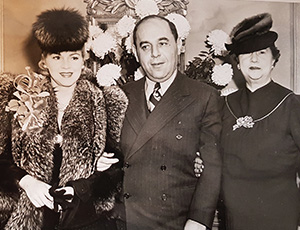
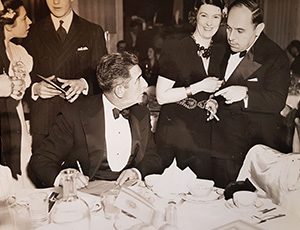
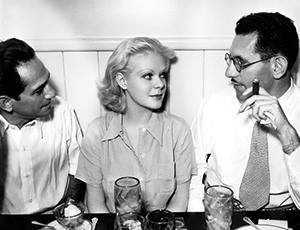
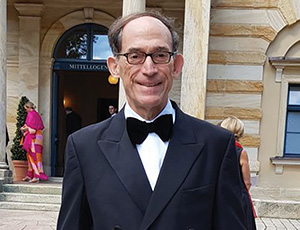
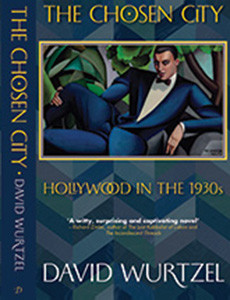
The Chosen City (Discript Ltd: September 2023): Bobby Steingrove is an outsider. His Jewish family runs their own motion picture studio in 1930s Hollywood, but Bobby’s father is dependent on the charity of his producer brother, who pays for Bobby to go to Yale. There he falls in with a moneyed set of amoral young men but dramatic misunderstandings destroy his social success, Bobby returns to work in his uncle’s film studio. When a friend publishes a novel with a thinly disguised Bobby as a protagonist, and his uncle’s biggest star insists on it becoming a film vehicle for her, he suddenly finds he has the chance to be an insider. But is that what Bobby really wants?

I was born in Hollywood. Jewish children in Los Angeles in those days were born in Cedars of Lebanon Hospital which was located in the part of town that was unquestionably Hollywood. As it happens, since 1917 my father’s family had worked in the movies, at what became 20th Century Studios. Until the age of 13, when I needed a haircut my mother would drive me to the barber’s shop on the Fox lot. We also used the dentist who practised out of Shirley Temple’s former bungalow.
My first cultural experiences were thus film and being taken to the movies. In due course my preferences shifted from the 1950s to the golden age of the 1930s-40s including any movie which co-stars Cary Grant and Katharine Hepburn. I remain devoted to the great American musicals in which pantheon I also place Sondheim. He has been produced brilliantly on the English stage, attracting actors who can do anything (I have seen Judi Dench in A Little Night Music and as Cleopatra; Adrian Lester in Company and as Othello). I also enjoyed Sondheim’s shows at RADA, whose students (among the most diverse I have witnessed) have a knack for it.
I had an inspiring American literature teacher in high school who introduced me to Faulkner, Hawthorne, Dickinson and Eugene O’Neill. Fitzgerald, Hemingway and Anne Tyler would come later. And in due course, Waugh, Trollope, Jane Austen and Zola.
When I arrived in England for my junior year abroad I discovered an unsatisfied – soon to be insatiable – love of theatre and something called opera. The latter started well with The Magic Flute. I will see anything by Mozart, Richard Strauss and Benjamin Britten. Sadly, we are now in the era of ‘director’s opera’ and peculiar interpretations. But choice has greatly expanded with the growth of summer opera festivals, all of whom do massive outreach to young people. One’s taste in music is a matter of individual preference. It has nothing to do with education or class. Listen to the young singers being interviewed on Radio 3. They are not elitist. They happen to have a huge love and understanding of music, and when they are good they bring the audience with them. And hands up, I go to Bayreuth. Sitting in that non-air conditioned festival hall at the height of summer, with the astonishing acoustics, and among fellow pilgrims who have made the effort to travel to be there adds to the emotional impact of the music.
One of the happiest years of my life was being a lay member of the Laurence Olivier Awards Panel, which allowed me free stalls seats to 97 productions in 13 months. It taught me to appreciate each genre on its own terms, from King Lear to Nunsense. Over the years I have seen 25 Hamlets because when 25 actors (men and women) speak Shakespeare’s words, you see something new in them each time. Nowadays respect for the text is ebbing. The more modern writers have been treated more kindly. I remain a devoted Shavian, I adore Noel Coward and Alan Bennett and look forward to the next James Graham or Mike Bartlett.
When I returned to England and took the unprecedented step in my family of becoming a barrister, all these cultural longings could be satisfied. Plays have a dramatic arc to them. Trials do as well. The feeling inside court as the evidence unfolds was as exciting as the feeling in a theatre as the actors connected to the audience. I started asking myself ‘What is this case all about? Where is the motivation?’ My opponents attacked me for being an amateur psychologist. But understanding that people don’t always weigh up the alternatives or consequences before doing something, seemed more helpful to the jury than defence counsel submitting ‘who would do this?’ when the issue was who did it, not whether a crime had been committed.
Could anyone spend their professional life in an Inn without becoming hooked on history and architecture? I joined the Georgian Group 40 years ago, then the Furniture History Society and now the Decorative Arts Society, touring with groups at home and abroad that include curators who share knowledge and help you to see things you might otherwise not appreciate. Not unlike listening to barristers at the top of their game.
My novel, The Chosen City, has had a long gestation. It is a saga about a Jewish family who own a motion picture studio, narrated by the outsider member of the family. I began with some of my own family stories but created a narrator who was nothing like me. It also deals with belonging and acceptance. Having spent most of my life as an immigrant who admires the culture of another country, I hope I can understand that.





The Chosen City (Discript Ltd: September 2023): Bobby Steingrove is an outsider. His Jewish family runs their own motion picture studio in 1930s Hollywood, but Bobby’s father is dependent on the charity of his producer brother, who pays for Bobby to go to Yale. There he falls in with a moneyed set of amoral young men but dramatic misunderstandings destroy his social success, Bobby returns to work in his uncle’s film studio. When a friend publishes a novel with a thinly disguised Bobby as a protagonist, and his uncle’s biggest star insists on it becoming a film vehicle for her, he suddenly finds he has the chance to be an insider. But is that what Bobby really wants?


The Bar Council is ready to support a turn to the efficiencies that will make a difference
By Louise Crush of Westgate Wealth Management
Marie Law, Director of Toxicology at AlphaBiolabs, examines the latest ONS data on drug misuse and its implications for toxicology testing in family law cases
An interview with Rob Wagg, CEO of New Park Court Chambers
What meaningful steps can you take in 2026 to advance your legal career? asks Thomas Cowan of St Pauls Chambers
Marie Law, Director of Toxicology at AlphaBiolabs, explains why drugs may appear in test results, despite the donor denying use of them
The appointments of 96 new King’s Counsel (also known as silk) are announced today
Ready for the new way to do tax returns? David Southern KC continues his series explaining the impact on barristers. In part 2, a worked example shows the specific practicalities of adapting to the new system
Resolution of the criminal justice crisis does not lie in reheating old ideas that have been roundly rejected before, say Ed Vickers KC, Faras Baloch and Katie Bacon
With pupillage application season under way, Laura Wright reflects on her route to ‘tech barrister’ and offers advice for those aiming at a career at the Bar
Jury-less trial proposals threaten fairness, legitimacy and democracy without ending the backlog, writes Professor Cheryl Thomas KC (Hon), the UK’s leading expert on juries, judges and courts